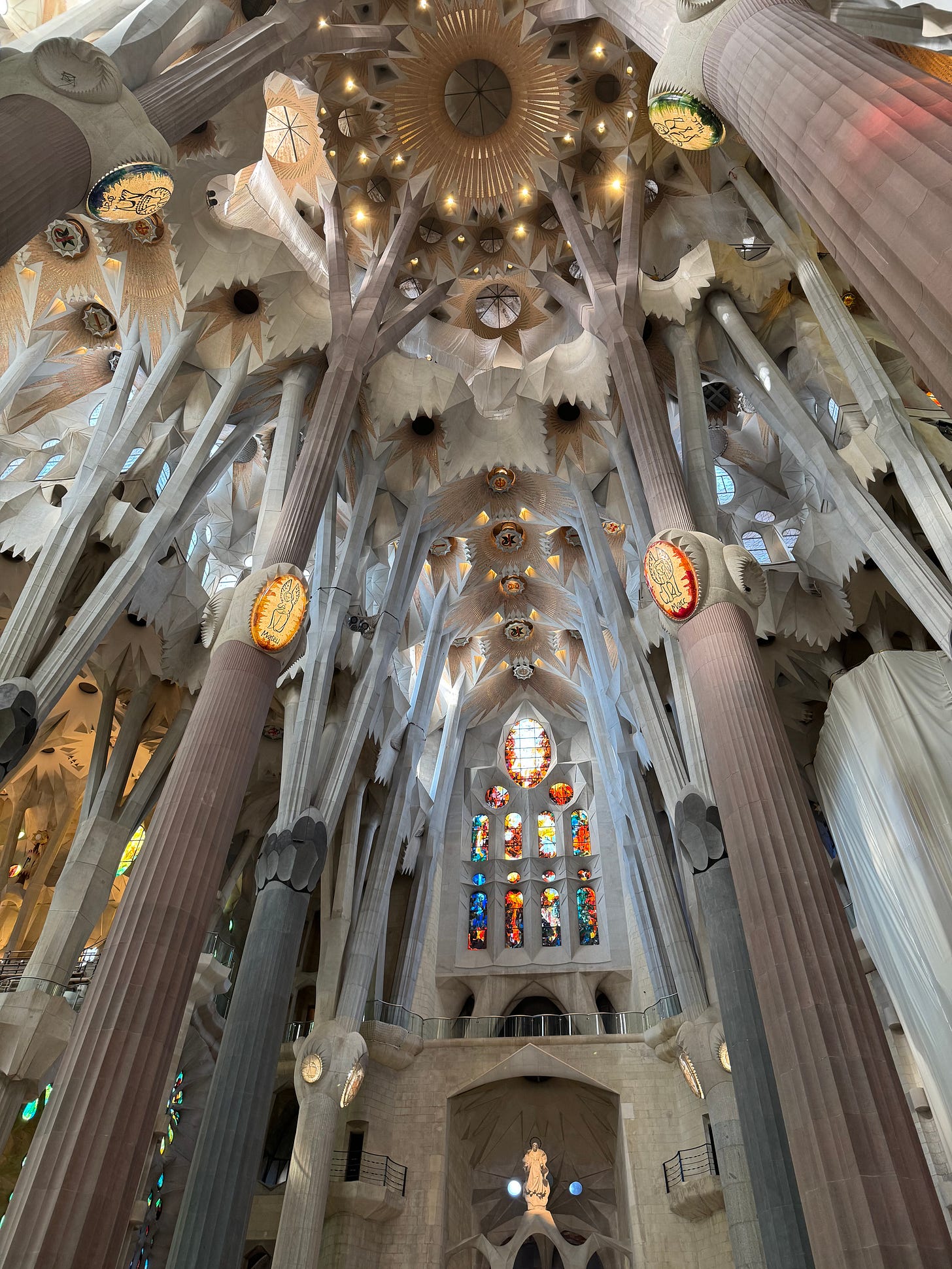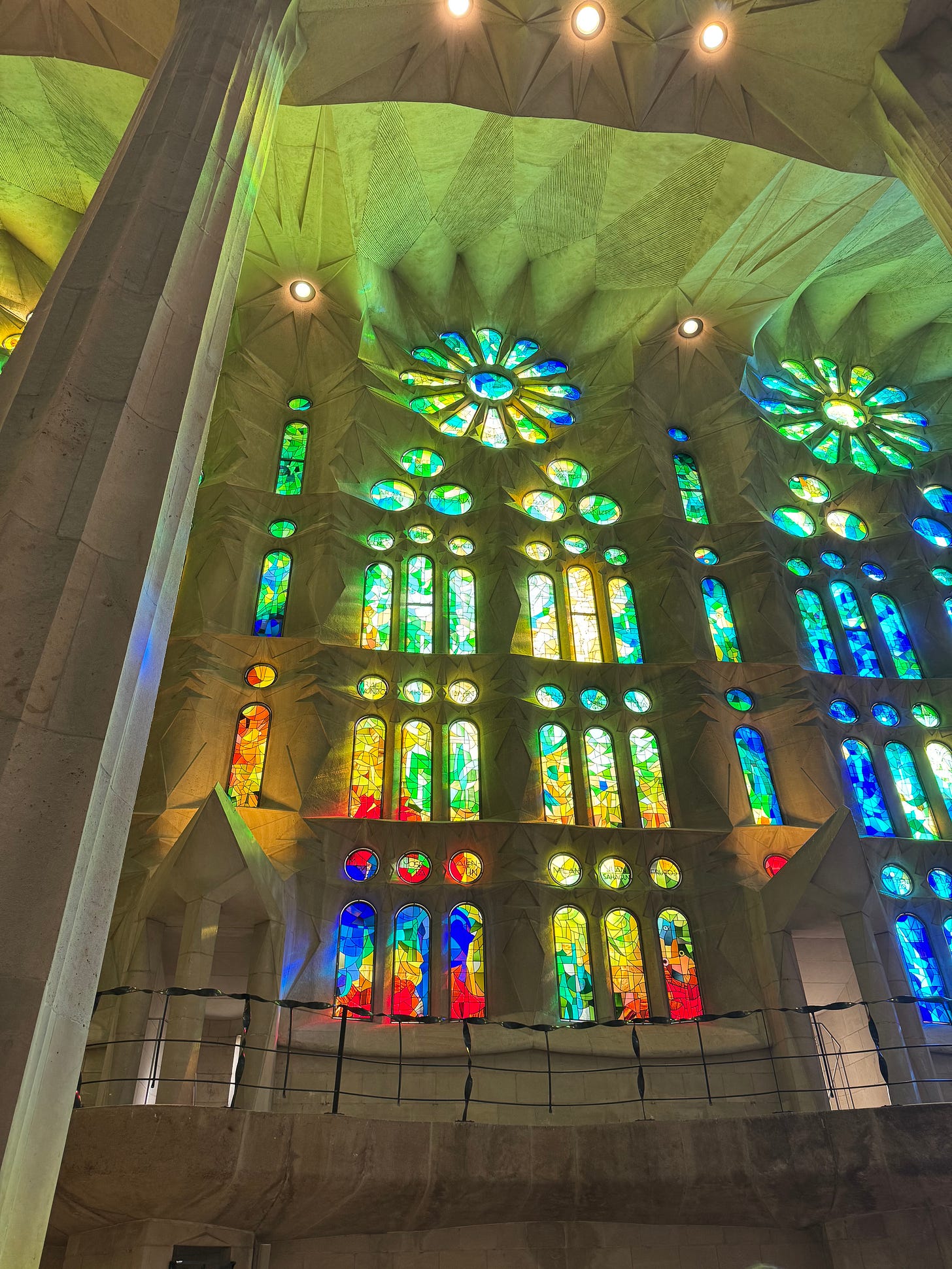I am in Barcelona with the family this week, trying not to murder one another whilst culturing our two eldest spawn up with Spanish guitar/Flamenco performances, schlepping them around the Gothic Quarter, and attending a worship service inside the jaw-dropping, awe-inducing Sagrada Familia—all thanks to the crackerjack planning of my wife. It’s the kids’ first time out of the country, and an eye-opening experience for them. I was going to send out an older piece of writing today, but I thought instead, I would just send it, get sendy, full send1, and see if I could write something worthwhile quickly.
Quick sidenote— I brought two books on this trip: The System by
and TechGnosis by Erik Davis. Both are capitol Q-Quality, in the way that Phaedrus’s fellow professor meant the term in Zen and the Art of Motorcycle Maintenance.The West is facing serious challenges in this decade—the meaning crisis, the metacrisis, the polycrisis, the long emergency, the turbulent twenties, the permacrisis, etc, etc. It’s just the hand we’ve been dealt. In the military, we would say it is what it is, which serves as a reminder to stop complaining or ruminating and just get on with it. I did a weird version of a literature review of the liminal community a few years ago, if you’re at all curious:
Metacrisis & Metamodernism Primer
Summary: Metacrisis is an umbrella term for the wicked, interlocking collection of crises facing humanity in the 2020s. Metamodernism is defined by various thinkers as an emerging aesthetic movement, a cultural phase, a developmental stage, a philosophical paradigm, and/or a political ideology. Such a wide lens is very much on brand with its “yes, and” …
However we want to think about it—I don’t think most people would describe where we are at present as a good place.
The issues we highlight, and the solutions we think of will be different, depending on who we are, our experience, and all the various components that make people different.
Should we attack these challenges from the top down, or the bottom up? Or both?
I’m always searching for the commonalities.
I’ve seen the following two concepts spoken of separately, but never together. They could be the ultimate nonlinearity—the chocolate and peanut butter combo that becomes more than the sum of its parts.
When we look at the modern world, it’s clear we have a great deal of material abundance. It’s not spread evenly, of course, and class disparities are part of what people will point to as causes and solutions. But in general, humans in the West have more stuff now, and a better material standard of living than years past.
But things don’t feel great.
The advent of the internet, smartphones, social media, and now LLMs has reconfigured our lives. It’s scrambled relationships, disrupted jobs, fractured our sense-making capabilities, altered our thinking, attending, and writing. Big change in a small amount of time.
And this is before widespread adoption of tools that can create illusions via text, email, pictures, and video. The leading edges are here, but it’s not ubiquitous quite yet.
None of that is going back to the way it was—the past is a foreign country, and they do things differently there, as novelist L.P. Hartley wrote. Plato was critical of the effect of the written word on human memory, and Victor Hugo lamented the printing press eclipsing architecture.
Reality hasn’t collapsed just yet, but the danger signs are there.
So how are we supposed to live?
How should we be in the world?
And how should we prepare our children to live in this world, one so different from what came before?
We are disconnected from our bodies, alienated from our friends and communities, and adrift on the values front.
I find myself settling on Primal Nobility, as some equilibrium point that can bring about the adjacent possible.
Maybe it was walking through the Sagrada that put this piece together—the interior is meant to evoke a walk through a forest, which is both primal and noble.
When I say Primal, I mean something that is ancient, original, and foundational — tied to the earliest forms of life, thought, and instinct. It is elemental, visceral, embodied, somatic, untouched by layers of social conditioning or cultural refinement. To act from the primal is to respond from the deep, instinctual core of being, where survival, passion, and creation originate. This is what I see people like
talking about. If we can rekindle this primal core, many of our modern anxieties and ills would fade.When I say Nobility, I mean a higher quality of character, marked by honor, integrity, and moral courage. It involves rising above base impulses or self-interest, to act in service of higher values or the greater good. Beyond titles or social rank, nobility is a grace of spirit expressed through dignity, compassion, and wisdom. I see thinkers like
talking about this side of the equation. Our modern economy incentivizes short-term focus and selfish decisions, with little considerations to others, the world, or future generations.This could be read as a contradiction— primal seems to be about base impulses, while nobility is about overcoming those impulses.
But I don’t think they’re a contradiction. I think they complement one another, like chocolate and peanut butter.
Primal—move your body, get into your body, stop overthinking, feel the wind and the rain and the dirt between your toes. Stalk a deer, choke your friend out on the mats, spend yourself in a crushing workout.
Nobility—seek the flourishing of your gifts in service of others, use power wisely and justly, live up to your potential. Be excellent, and aim yourself towards a higher, transcendent purpose.
Taken to an extreme, either of these concepts can get pathological, slip slide into the shadow side. But in the right amounts, rekindling our primal and noble selves would do much to cure our modern malaise. I believe both concepts are compatible with most of us.
Primal—for we are meant to be outside, to stare into a fire with kith and kin, watch the play of light as the day fades. To stop thinking quite so much, and find the intelligence in action and movement. To be intuitive.
Noble—for we are important as individuals, but not the most important. There is the community and the transcendent—whether you think of that as nature, the universe, or something more. Use our power wisely, as stewards.
Currere Certamen Tuum / Run Your Race
As the kids say. Although I think the kids said stuff like that ten years ago, so now the kids would cringe, as I’m trying to get my daughter to do. I play the long game here.









Perfect. This encapsulates what I call “radical living” — but far more clearly. Thanks for this, Adam.
Adam: your term Primal Nobility is spot on; your definition of each separately hits home, and together the synergy is powerful. Certainly inspired in part by your location. Bravo. Tim